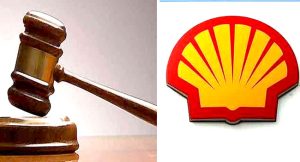
A Federal High Court sitting in Abuja has ordered Shell to shell out the sum of N45.9 billion as compensation to the people of Ogoni in Rivers State.
The sum is a cost awarded against the company several years ago for oil spillage in Ogoniland.
Justice Ahmed Mohammed, who gave the order on Wednesday, held that the amount must be paid to the Ogoni people within 21 days.
In his submission, counsel to Shell Petroleum Development Company (SPDC), Aham Ejelamo, informed the court that his client had agreed to make the payment.
He proposed that the money be paid through the Registrar of the court in a bank about to be opened for the purpose.
But Justice Mohammed ruled against the request and ordered that the payment be made within the period given through the account of the lawyer to the Ogoni people, Mr Lucius Nwosu.
He explained that this was in line with the decision of both the high court and the Supreme Court.
Naija News reports that Ogoniland is located in the south-east senatorial district of Rivers in the nation’s Niger Delta region. Its people have been victims of oil spillage for several years.
Ten representatives of the Ogoni people instituted the suit against Shell in 2001 for the losses allegedly caused by the oil spills.
In June 2010, Ibrahim Buba, then of Port Harcourt division of the Federal High Court, awarded N17 billion against Shell as compensation for the sufferings inflicted on the people of Ogoniland.
The court equally granted the Ogoni chiefs a 25 per cent interest charge on the principal sum of about N17 billion.
SPDC appealed against the judgment up to the supreme court but lost. In 2020, the company also approached the apex court seeking a review of the judgment debt.
After several years of legal tussle, the Supreme Court upheld the judgement of the lower court – but Shell Petroleum Company was not satisfied as it sought for some considerations.
When the matter came up on Wednesday, Justice Mohammed explained that it would amount to burying the judgement of the apex court to rule otherwise.
Ejelamo sought the court’s permission to pay the debt through the chief registrar of the court in a bank account to be opened for the purpose.
However, it was eventually agreed that the money should be paid to the aggrieved people through their lawyer.
This article was originally published on Nigeria News


